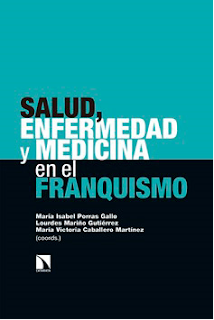Novedad: SALUD, ENFERMEDAD Y MEDICINA EN EL FRANQUISMO

María Isabel Porras Gallo, Lourdes Mariño Gutiérrez y María Victoria Caballero Martínez (coords.) Esta monografía realiza un diagnóstico de la situación y la evolución de la sanidad durante el periodo franquista y la Transición. A lo largo de sus capítulos se abordan temas como la relación entre la psiquiatría oficial y la ideología del régimen en sus diferentes fases. Asimismo, se explora la relación entre España y la Organización Mundial de la Salud, mostrando el impacto del establecimiento de programas colaborativos en la atención a los prematuros y la lucha contra enfermedades infecciosas, y se presenta la evolución histórica de la estructura sanitaria española con el establecimiento de las zonas de demostración sanitaria y la creación de la Red Hospitalaria Nacional, así como la ideología tras el proceso de regionalización de la sanidad una vez promulgada la Constitución de 1978. El marco se amplía con un acercamiento a las crisis sanitarias del tardofranquismo y la Transició...
